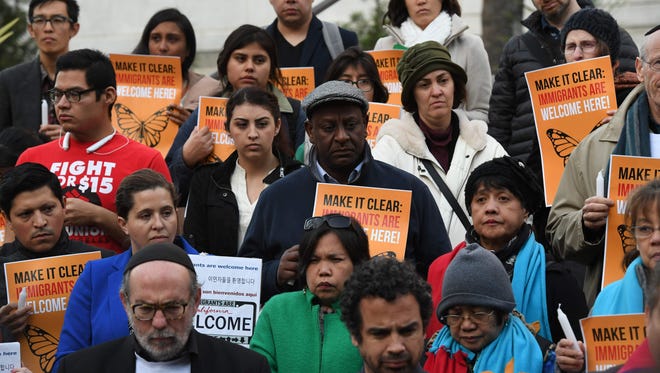Police divided over Trump's 'sanctuary city' order
WASHINGTON — National law enforcement groups are sharply divided over President Trump’s plan to crack down on sanctuary cities that shield illegal immigrants from deportation, as some warn that law enforcement's already fraught relationship with minority communities could be further damaged by pressing local officers to enforce immigration laws.

Central to Trump's order aimed at up to 300 communities that maintain policies protecting the undocumented is a threat to withhold federal money from cities that do not comply with federal immigration enforcement efforts. Although the order contains a provision that could allow funding to continue to flow to local police, pending approval by the attorney general, some law enforcement and municipal authorities described the action as akin to unlawful "coercion.''
"Local police departments work hard to build and preserve trust with all of the communities they serve, including immigrant communities,'' a joint statement issued by the Major Cities Chiefs Association and the U.S. Conference of Mayors said. "Immigrants residing in our cities must be able to trust the police and all of the city government.''
It is not the first time the chiefs' group, a coalition of top police officials representing the largest agencies in the country, has counseled against expanding local police responsibilities to include immigration enforcement.
Four years ago, the group issued its own “immigration policy paper’’ warning that local officers lacked basic resources, training and "clear authority'' to assist in such matters.
"Immigration laws are very complex and the training required to understand them significantly detracts from the core mission of local police to create safe communities,'' the association stated.
Seeking Justice guidance
Within hours after Wednesday's order was issued, Thomas Manger, president of the chiefs' association, and Tom Cochran, executive director of the mayors' conference, called for a meeting with the Justice Department for guidance on how to proceed. Trump's attorney general nominee, Alabama Sen. Jeff Sessions, known for his hard-line approach to immigration policy, is awaiting a Senate confirmation vote
Chuck Wexler, executive director of the Police Executive Research Forum, said that police operating in so-called sanctuary cities have been shadowed by the "false perception'' that they have been held back from pursuing serious criminals.
"That is just not correct,'' said Wexler, who also chaired a Department of Homeland Security panel that examined security in heavily immigrant communities. "When it came to dealing with serious criminals, there was no ambiguity on what needed to be done.''
At the same time, Wexler said, police should not be substitutes for everyday immigration agents, enforcing status disputes and other minor civil violations.
"Local police need to have the community's confidence and know they can be free to report problems without consequences,'' he said. "If people are afraid to come to the police, that domestic violence incident today will be a homicide tomorrow and that's in no one's interest.''
Read more:
Chicago, after Trump's 'carnage' comment: Show us the money
Trump orders clamp down on immigrant 'sanctuary cities,' pushes border wall
Trump's directive, meanwhile, won the endorsement of the nation's largest police union and a national coalition of sheriffs.
“Previous solutions called for an unequivocal end to all federal grants for recalcitrant jurisdictions and there was a real concern about this approach,’’ Fraternal Order of Police President Chuck Canterbury said. The union said the provision in Trump's order that preserved the eligibility of police in sanctuary cities for federal grants, with the attorney general's approval, sealed its support.
“The FOP opposed several bills in the previous Congress which would have blocked state and local law enforcement grants to sanctuary cities because in most cases these sanctuary jurisdictions were established by policymakers at the local level,'' Canterbury said. "The FOP argued that it was unfair to penalize the law enforcement agencies serving these jurisdictions for the political decisions of elected officials which prohibited or impeded cooperation with federal agencies.''
Jonathan Thompson, executive director of the National Sheriffs' Association, said the president's pledge add thousands to the ranks of the Border Patrol and Immigration and Customs Enforcement would ease the dependence on local law enforcement.
"It's key to remember that for too long sheriffs were the meat in the immigration enforcement sandwich,'' Thompson said. "No more. (Trump) is hiring 10,000 enforcement officers, which we have been calling for.''
